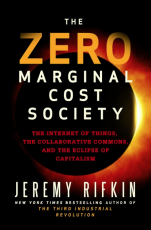 The Zero Marginal Cost Society: The Internet of Things, the Collaborative Commons, and the Eclipse of Capitalism
The Zero Marginal Cost Society: The Internet of Things, the Collaborative Commons, and the Eclipse of Capitalism
Palgrave Macmillan, April 2014
In The Zero Marginal Cost Society, Jeremy Rifkin argues
that the capitalist era is slowly passing from the world's stage.
The emerging Internet of Things is giving rise to a new economic
system -- the Collaborative Commons -- that is transforming our
way of life.
In 2011, Jeremy Rifkin published the New York Times bestseller, The Third Industrial Revolution, which captured the attention of the world. His vision of a sustainable, post-carbon economic era has been endorsed by the European Union and the United Nations and embraced by world leaders including Chancellor Angela Merkel of Germany, President François Hollande of France, and Premier Li Keqiang of China.
In his provocative new book, The Zero Marginal Cost Society,
Rifkin explains how the Communications Internet, Energy Internet,
and Logistics Internet are converging to create a global neural
network, connecting every thing and everyone in an Internet of
Things. This seamless, smart, twenty-first-century infrastructure
is accelerating productivity and reducing the marginal cost of
producing and distributing additional units of goods and services
-- if fixed costs are not counted -- to nearly zero, making them
essentially free. As a result, corporate profits are beginning to
dry up, property rights are weakening, and the conventional notion
of economic scarcity is giving way to the possibility of abundance
as whole sectors of the economy are drawn into the zero marginal
cost web. The wild card is ensuring data security and the
protection of personal privacy in an open, transparent, and
globally connected world.
Rifkin concludes that capitalism will be with us for the foreseeable future, albeit in an increasingly streamlined role, primarily as an aggregator of network services and solutions, allowing it to flourish as a powerful niche player in the coming era. However, it will no longer reign over the economy by the second half of the twenty-first century. We are, Rifkin says, entering a world beyond markets where we are learning how to live together in an increasingly interdependent global Collaborative Communications.
Hardcover | ISBN: 9781137278463 | Publication Date: April 2014
Reviews:
"Jeremy Rifkin offers an ambitious and optimistic image of how a
Collaborative Commons could displace industrial capitalism when
the peer-to-peer economic and social practices of the Internet are
extended to energy, logistics, and material fabrication. Even
skeptical readers, concerned with the ubiquitous surveillance and
exquisite social control that these same technologies enable,
should find the vision exhilarating and its exposition thought
provoking."
-- Yochai Benkler, Harvard Law School
"This breathtaking book connects some of today's most compelling
technology-driven trends into a five-hundred-year spiral from
commons to capitalism and back. Rifkin has produced an
intellectual joyride that takes us to the threshold of a new
economic order."
-- Kevin Werbach, the Wharton School
"The Zero Marginal Cost Society confirms Jeremy Rifkin as
the peerless visionary of technological trends. The future arrives
only to fill in the sketches that Rifkin so ably draws. I highly
recommend this book as a cure for those who are perplexed about
the future of technology."
-- Calestous Juma, John F. Kennedy School of
Government, Harvard University
"In his latest work, Jeremy Rifkin turns his gaze on the world in
which almost everything has a marginal cost approaching zero. His
radical conclusions -- foretelling the eclipse of our current
economic system and the rise of the "collaboratists" -- will make
this one of the most discussed books of the year."
-- James Boyle, the Center for the Study of the
Public Domain, Duke Law School
"Jeremy Rifkin makes the undeniable case for our growing, global
collaborative destiny. I dare you to read this book and not
rethink your future!
-- Lisa Gansky, author of The Mesh: Why the
Future of Business is Sharing
"A comprehensive exploration of the implications of anyone being
able to make anything"
-- Neil Gershenfeld, Director, MIT Center for Bits
and Atoms





